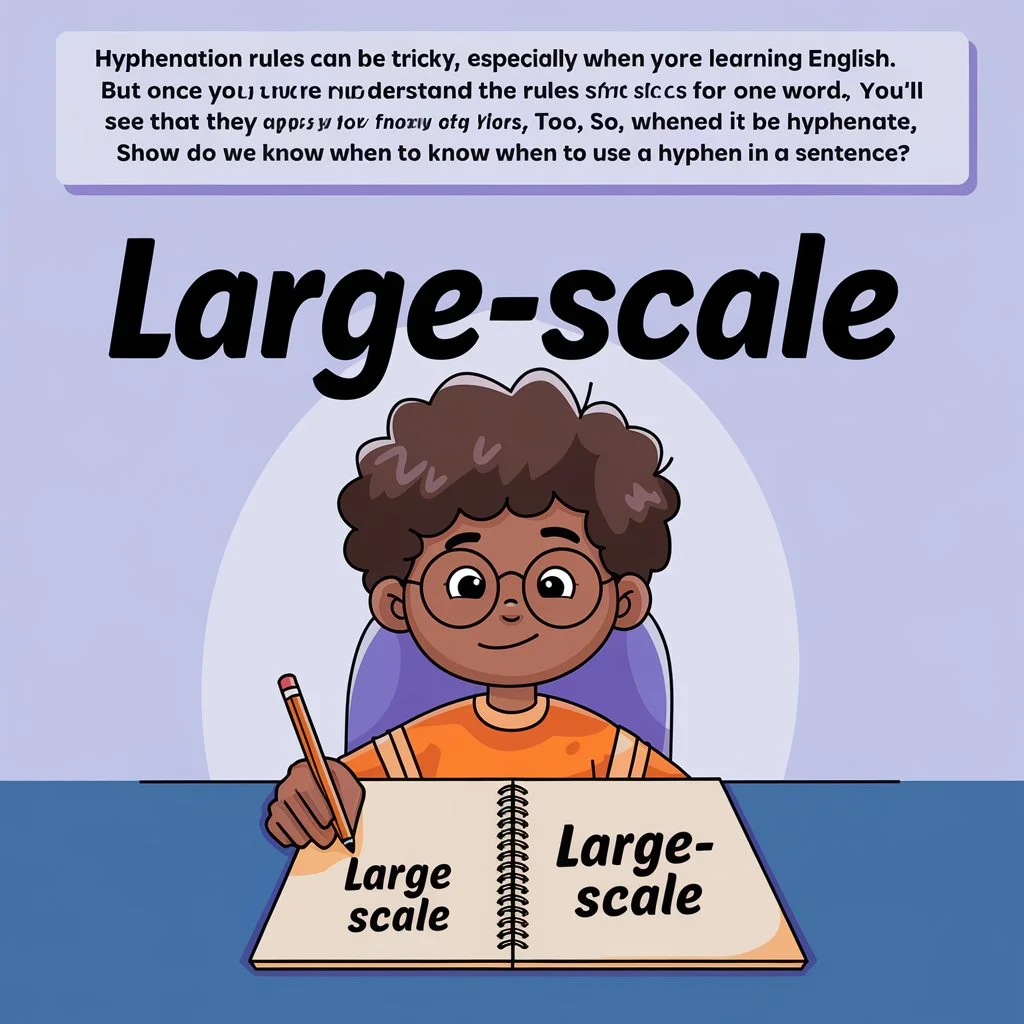“Discover the differences between large scale and large-scale in this comprehensive guide. Learn when to use each term correctly, along with examples and practical tips to enhance your writing skills.”
Hyphenation rules can be tricky, especially when you’re learning English. But once you understand the rules for one word, you’ll see that they often apply to others, too. So, when it comes to large-scale, should it be hyphenated or not? How do we know when to use a hyphen in a sentence?
Large Scale or Large-Scale: Hyphenated or Not?
The decision between using large scale or large-scale boils down to whether there’s a noun or object to modify. When the phrase modifies a noun or object, you should hyphenate the words, making it large-scale. The hyphen tells us that the two words act together as an adjective. But if there’s no noun or object to modify, then we leave it as large scale without a hyphen, using it as a noun phrase.
Examples of When to Use “Large Scale”
Now that we’ve covered the basics, let’s dive into some examples. You’ll find that the unhyphenated version is often used at the end of a clause, acting as a noun.
- The project is large scale.
- We are working on a large scale.
- This building is large scale.
- I only work on a large scale.
- That boat is large scale.
- The event was organized on a large scale.
- We are planning this expansion on a large scale.
- The factory operates at a large scale.
- They handle their investments on a large scale.
- The concert was held on a large scale.
- The cleanup effort was conducted on a large scale.
- The movie was produced on a large scale.
- Their project was successful on a large scale.
- This disaster occurred on a large scale.
- The company’s growth happened on a large scale.
- The pollution problem is being tackled on a large scale.
- Their operations were carried out on a large scale.
- This project demands funding on a large scale.
- The campaign was launched on a large scale.
- That building was constructed on a large scale.
- The protest took place on a large scale.
- The development of technology is happening on a large scale.
- The research was done on a large scale.
- The expansion plan was implemented on a large scale.
- The marketing effort succeeded on a large scale.
- The initiative was rolled out on a large scale.
- The changes were made on a large scale.
- The issue was discussed on a large scale.
- Their strategy was executed on a large scale.
- The manufacturing was automated on a large scale.
Examples of When to Use “Large-Scale”
We use large-scale when it comes before a noun or object, meaning it’s functioning as an adjective that describes that noun.
- That is a large-scale building.
- I can’t get through this large-scale project alone.
- I’m a large-scale thinker.
- We work for a large-scale firm.
- This is a large-scale construction.
- The company is known for its large-scale operations.
- They undertook a large-scale renovation of the building.
- This is a large-scale initiative to improve education.
- The large-scale project required significant investment.
- We are planning a large-scale event for the anniversary.
- The team is working on a large-scale research study.
- The government announced a large-scale infrastructure plan.
- This large-scale manufacturing facility produces thousands of products daily.
- The large-scale model demonstrated the city’s future development.
- She was tasked with leading a large-scale marketing campaign.
- The large-scale merger between the companies will reshape the industry.
- A large-scale survey was conducted to gather public opinions.
- The large-scale production of the new phone will begin next month.
- He presented a large-scale solution to the climate crisis.
- The artist created a large-scale mural for the museum.
- We need large-scale support to fund this charity drive.
- The city underwent a large-scale transformation in just five years.
- The large-scale deployment of solar panels reduced energy costs significantly.
- The large-scale upgrade to the system improved performance across the board.
- The large-scale agricultural project increased food supply in the region.
- Their large-scale data analysis helped solve the problem faster.
- The large-scale distribution of vaccines was critical in controlling the pandemic.
- The large-scale construction of the bridge took several years to complete.
- The large-scale collaboration between researchers led to a groundbreaking discovery.
- The company’s large-scale expansion into new markets boosted its profits.
Is Large Scale Hyphenated in AP Style?
According to AP style guidelines, hyphenation is often used as a connector to clarify that words are working together to modify a noun or object. When someone asks, “Is large scale hyphenated?” AP style teaches us that the hyphen is necessary when the phrase acts as an adjective. When there is no noun to modify, the hyphen is dropped, and large scale is used as a phrase noun.
Should I Capitalize “Scale” in the Word “Large-Scale”?
Capitalization rules can be confusing, and adding a hyphenated word makes them even harder. So, what should we do when large-scale appears in a title? The answer depends on the capitalization style you’re using.
- Style One: Capitalizes only the first word and any proper nouns. In this case, “large-scale” would appear as “large-scale” (with only “large” capitalized if it starts the title).
- Style Two: Capitalizes all words except articles, short prepositions, and conjunctions. Here, “large” would be capitalized no matter where it appears, while “scale” would remain lowercase: “Large-scale”.
- Style Three: Capitalizes every word, so both large and scale would be capitalized: “Large-Scale”. This style is common in more informal writing.
Alternatives to “Large Scale”
If you’re struggling with remembering hyphenation rules, here are some alternatives to “large scale” that can make things easier. These words convey the same meaning and eliminate the need to worry about whether to hyphenate:
- Extensive
- Sweeping
- Broad
- Massive
- Nationwide
Quiz – Large Scale or Large-Scale?
Let’s test what you’ve learned. For each sentence, choose the correct form of large scale or large-scale:
- The operation was (A. large scale / B. large-scale).
- This is a (A. large scale / B. large-scale) task.
- You only work on a (A. large scale / B. large-scale).
- The (A. large scale / B. large-scale) building across the street just opened.
- I’m part of a (A. large scale / B. large-scale) project.
Quiz Answers
- A
- B
- A
- B
- B
By understanding the difference between large scale and large-scale, you’ll find that mastering these hyphenation rules becomes a lot easier.
FAQs
When do you use “large scale” without a hyphen?
You use large scale without a hyphen when it’s not modifying a noun directly. In this case, it stands alone as a phrase noun. You’ll typically see it at the end of a sentence or clause, where it’s not acting as an adjective. For example, “We operate on a large scale.” Here, there is no noun being described, so there’s no need for a hyphen. Think of it as talking about the size or extent of something rather than describing a specific object.
When do you use “large-scale” with a hyphen?
You use large-scale with a hyphen when it’s used as an adjective to describe or modify a noun. The hyphen connects the words “large” and “scale” to show they are working together as one descriptive term. For example, “This is a large-scale project.” The hyphen clarifies that the project is big, rather than saying the scale itself is large. Without the hyphen, the meaning would be unclear. The hyphen ensures that readers understand the phrase is modifying the noun that follows it.
Why is there a hyphen in “large-scale”?
The hyphen is used to combine “large” and “scale” into one adjective when they are describing a noun. This makes the meaning clear and shows that the two words belong together as a modifier. For example, “a large-scale operation” means an operation that is extensive in size. Without the hyphen, readers might think “large” and “scale” are two separate things. The hyphen makes sure the reader knows the words are working together to describe something. It improves clarity and prevents misunderstanding.
Is “large-scale” always hyphenated?
No, large-scale is not always hyphenated. You only use the hyphen when the phrase is modifying a noun, acting as an adjective. When it’s not describing a noun, you use large scale without a hyphen. For instance, “This operation is on a large scale” doesn’t need the hyphen because it’s used as a noun phrase. However, if it’s describing a project, you would say “a large-scale project.” The hyphen depends on how the words are functioning in the sentence.
Can I use “large scale” at the beginning of a sentence?
Yes, you can use large scale at the beginning of a sentence if it’s not directly modifying a noun. For example, “Large scale is necessary for success.” Here, large scale is acting as a subject and doesn’t need a hyphen. However, if it’s describing a specific noun, such as in “Large-scale projects require careful planning,” you need to use the hyphen. The hyphen makes it clear that “large-scale” is acting as one descriptive adjective. It’s all about how the words are used in the sentence.
What does “large-scale” mean?
Large-scale refers to something that is done on a big or extensive level. It describes actions, projects, or operations that are significant in size or scope. For example, “a large-scale renovation” means the renovation is extensive and covers a wide area. The phrase suggests that the effort or impact is widespread or massive. It can apply to different areas like business, construction, or events. The hyphen helps clarify that the action is large in scale.
How do I know when to hyphenate “large-scale”?
You hyphenate large-scale when it is used as an adjective to describe a noun. If “large-scale” comes before a noun, such as in “a large-scale project,” you need the hyphen. However, if there’s no noun following it, you leave it unhyphenated, as in “We are working on a large scale.” The key is to look for the noun: if the phrase is describing it, use the hyphen. Without a noun, the hyphen isn’t necessary. Understanding this rule will help you write clearly.
What’s a good alternative to “large-scale”?
Some good alternatives to large-scale include words like extensive, massive, and broad. These words also describe something that is big or widespread. For example, instead of saying “a large-scale operation,” you could say “an extensive operation.” Other words like sweeping or nationwide can also work depending on the context. Using these synonyms can help you avoid repetition. They’re useful if you want to describe something without worrying about hyphenation rules.
Conclusion
In conclusion, understanding when to use large scale versus large-scale comes down to recognizing whether the phrase is modifying a noun. When acting as an adjective before a noun, the hyphen is needed to connect the words and make their meaning clear. Without a noun, large scale stands as its own phrase and remains unhyphenated. Mastering this simple rule can make your writing clearer and more professional. So, always keep an eye on the context to determine if a hyphen is necessary!

It’s Elara Winters, your guide at “Grammer Grove.” I’ve dived into the intricacies of crafting the perfect English writing sections for your project, research paper, or thesis. With a wealth of experience in this field, I’m here to help you express gratitude and appreciation effectively. Join me on this journey, and let’s make your English writings shine!












